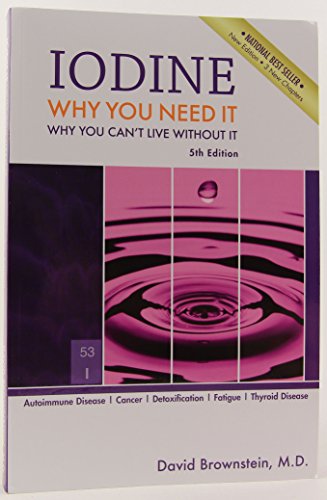Aricept is a commonly prescribed drug for treating Alzheimer’s disease. However, like all the Alzheimer’s drugs, Aricept does not work for the vast majority who take it. In my opinion, for the few who achieve some benefit with Aricept, the positive effects are minute and fleeting.
An article on Medscape.com (9.19.2019) was titled, “Alzheimer’s Drug Linked to Potentially Serious Muscle Condition.” The article reported on new data that found Aricept is associated with a 2x higher risk for hospital admission for rhabdomyolysis. Rhabdomyolysis is a life-threatening condition in which muscle cells break down which can lead to kidney failure and death. But wait, there is more! Unfortunately, there are many other potentially serious side effects of Aricept (as well as every other Alzheimer’s drug currently being prescribed).
 Iodine: Why You Need I...
Best Price: $25.00
Buy New $25.00
(as of 05:15 UTC - Details)
The Contraindications/Precautions section in the PDR for Aricept are lengthy. Be careful trying to read it—it is mind-numbing! Diarrhea, GI bleeding, GI disease, peptic ulcer disease and vomiting are just a few of the potential side effects of Aricept. Pancreatitis, gall bladder inflammation, seizures, arrhythmias, and slowed heart rate are listed as severe adverse reactions. How frequent are these reactions? Only The Shadow knows as the PDR lists “Incidence not known.” Moderate adverse reactions to Aricept include hostility, hallucinations, depression, hypertension, dehydrations, confusion, chest pain, bleeding, and hepatitis.
Iodine: Why You Need I...
Best Price: $25.00
Buy New $25.00
(as of 05:15 UTC - Details)
The Contraindications/Precautions section in the PDR for Aricept are lengthy. Be careful trying to read it—it is mind-numbing! Diarrhea, GI bleeding, GI disease, peptic ulcer disease and vomiting are just a few of the potential side effects of Aricept. Pancreatitis, gall bladder inflammation, seizures, arrhythmias, and slowed heart rate are listed as severe adverse reactions. How frequent are these reactions? Only The Shadow knows as the PDR lists “Incidence not known.” Moderate adverse reactions to Aricept include hostility, hallucinations, depression, hypertension, dehydrations, confusion, chest pain, bleeding, and hepatitis.
I won’t bother with the mild adverse reactions because no one should be taking this drug anyways.
Folks, the conventional approach to treating Alzheimer’s disease has been an unmitigated disaster. The drugs simply do not work and they are associated with far too many adverse effects. And, to make matters worse, they are expensive.





